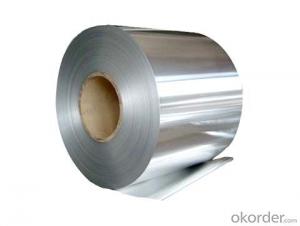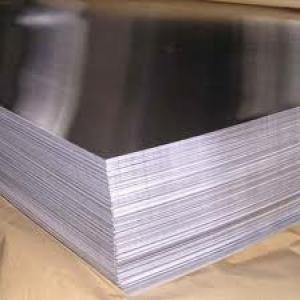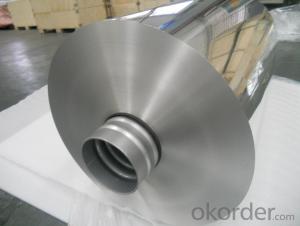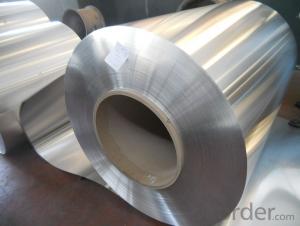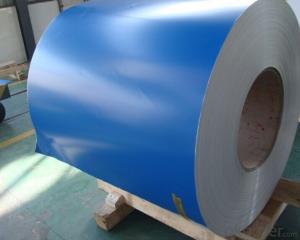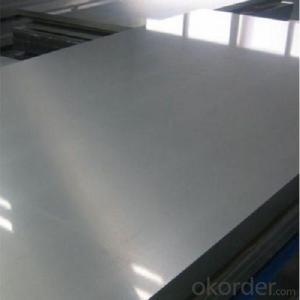Continuous Casting Aluminium Coils for Outer Building
- Loading Port:
- Shanghai
- Payment Terms:
- TT OR LC
- Min Order Qty:
- 5 m.t.
- Supply Capability:
- 20000 m.t./month
OKorder Service Pledge
OKorder Financial Service
You Might Also Like
Item specifice
1.Structure of Continuous Casting Aluminium Coils for Outer Building
Continuous Casting Aluminium Coils for Outer Building is one semi-finished aluminium material. This strip can be rolled down to aluminium coil,sheet,circle ect. The alloy AA1050 is widly used in building, industry ect. Its weight is much lower than steel. So many customers choosed aluminium material instead of steel.
2. Main features of Continuous Casting Aluminium Coils for Outer Building
a.Competitive price---We have our own mills and can produce mill finished aluminium coils, so we can control the production cost better.
b.Professional after-sale service---We have more than 15 years exportation experience and you need not worry about the exporation problems.
c.Fast delivery time---We can control the delivery time within 35 days.
3. Image
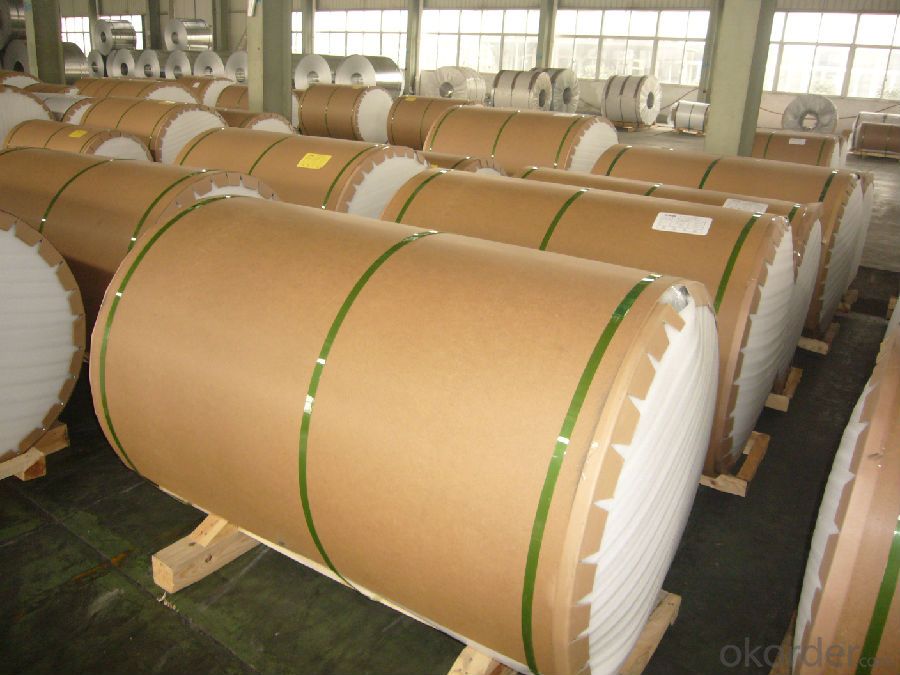
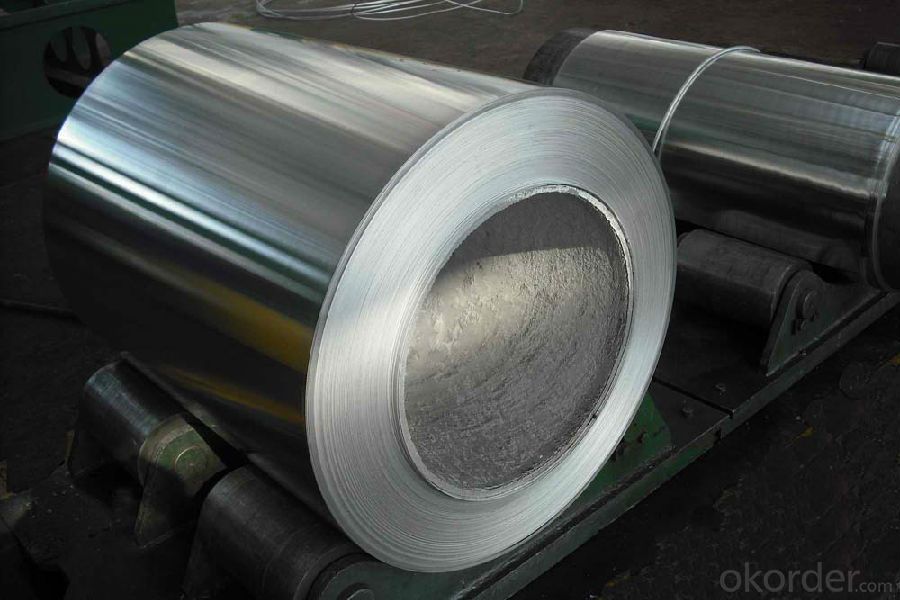
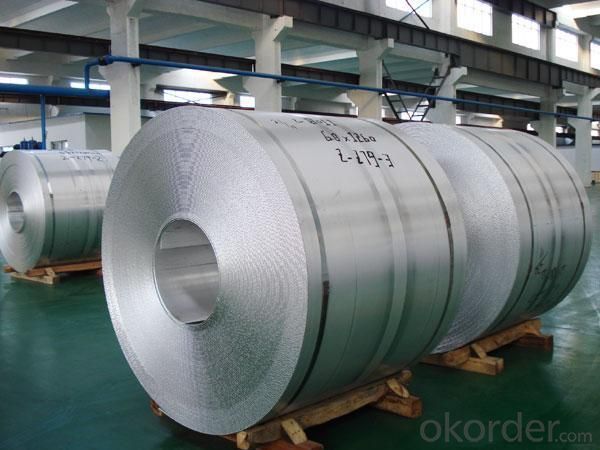
4. Product Specification
| Alloy | Temper | Thickness | Width | Weight |
| AA1050 | H14 | 0.2MM-3MM | 1000MM-1500MM | About 2.5 tons |
5.FAQ:
What is the quality standard?
---Usually our standard is GB3880-2006
What is the largest width?
---It is 2300mm
What is the MOQ?
---Usually we can accept 80 tons.
- Q:What are the environmental benefits of using aluminum sheets?
- There are several environmental benefits of using aluminum sheets. Firstly, aluminum is a highly recyclable material, meaning that it can be reused repeatedly without losing its quality. This reduces the need for mining and extraction of new aluminum, conserving natural resources and minimizing the environmental impact of the production process. Additionally, aluminum has a lower carbon footprint compared to other metals, as it requires less energy to produce. Moreover, aluminum is lightweight, which reduces fuel consumption during transportation, leading to lower greenhouse gas emissions. Overall, using aluminum sheets helps in promoting a more sustainable and eco-friendly approach to manufacturing and construction.
- Q:What is the surface finish of 101 aluminum sheets?
- The surface finish of 101 aluminum sheets can vary depending on the manufacturing process and desired application. Common surface finishes for 101 aluminum sheets include mill finish, brushed finish, and polished finish.
- Q:Are 101 aluminum sheets suitable for heat sinks?
- No, 101 aluminum sheets are not suitable for heat sinks. Heat sinks are designed to dissipate heat and therefore require materials with high thermal conductivity. 101 aluminum has a lower thermal conductivity compared to other aluminum alloys commonly used for heat sinks, such as 6061 or 6063. These alloys have better thermal conductivity properties, allowing them to effectively transfer heat away from the heat source. Therefore, it is recommended to use aluminum alloys specifically designed for heat sinks to ensure optimal heat dissipation and cooling performance.
- Q:What are the advantages of using aluminum sheet in construction?
- There are several advantages to using aluminum sheet in construction. Firstly, aluminum is a lightweight material, making it easier to handle and transport on construction sites. This reduces the need for heavy machinery and equipment, resulting in cost savings and improved efficiency. Secondly, aluminum has excellent corrosion resistance properties. Unlike other metals, such as steel, aluminum does not rust or corrode when exposed to moisture or harsh weather conditions. This makes it highly durable and suitable for outdoor applications, such as roofing or cladding. Additionally, aluminum is a highly versatile material that can be easily shaped and formed into different sizes and profiles. This allows for greater design flexibility, enabling architects and engineers to create innovative and unique structures. Moreover, aluminum is a sustainable material. It is 100% recyclable, meaning that it can be reused indefinitely without any loss in quality or performance. This makes it an environmentally friendly choice for construction projects, as it helps reduce waste and minimize the carbon footprint. Furthermore, aluminum has excellent thermal and electrical conductivity properties. It reflects heat and light, helping to maintain comfortable indoor temperatures and reduce energy consumption. It is also an excellent conductor of electricity, making it ideal for electrical wiring and components in buildings. Lastly, aluminum is a cost-effective material in the long run. Although it may have a higher initial cost compared to other building materials, its low maintenance requirements and long lifespan offset these costs over time. It does not require painting or regular upkeep, saving both time and money in the maintenance and repair of structures. In conclusion, the advantages of using aluminum sheet in construction include its lightweight nature, corrosion resistance, versatility, sustainability, thermal and electrical conductivity, and cost-effectiveness. These qualities make it a highly desirable material for a wide range of construction applications.
- Q:Can aluminum sheets be used for electronic enclosures?
- Indeed, electronic enclosures can make use of aluminum sheets. The remarkable characteristics of aluminum make it a frequently employed material for electronic enclosures. Its lightweight nature, resistance to corrosion, and ability to provide effective electromagnetic shielding are among its outstanding attributes. Aluminum sheets can be effortlessly shaped and crafted into diverse dimensions and configurations, rendering them well-suited for accommodating electronic components. Moreover, aluminum boasts commendable thermal conductivity, enabling efficient dissipation of heat from the enclosed electronics. In summary, aluminum sheets are a favored option for electronic enclosures owing to their durability, adaptability, and electrical properties.
- Q:Can the aluminum sheets be used for soundproofing applications?
- Indeed, soundproofing applications can make use of aluminum sheets. As a lightweight and immensely reflective substance, aluminum possesses the capability to effectively obstruct and absorb sound waves. By incorporating aluminum sheets into soundproofing endeavors, one can contribute to the reduction of noise transmission and the creation of a more serene atmosphere. These sheets can be employed as barriers, panels, or even as constituents of composite materials to augment soundproofing attributes. Moreover, aluminum sheets exhibit durability, resistance to corrosion, and ease of upkeep, rendering them fitting for sustained utilization in diverse soundproofing applications.
- Q:How to clean the aluminium oxide on the surface of aluminum? What kind of materials should we use to clean the thin aluminum sheet, and what's the concentration?
- You can sprinkle the mix of Alkaline water,vinegar,washing powder and liquid detergent on the surface. And after a period of time, rub it with soft silk, after it being dry,sprinkle again and rub until it's clean.
- Q:Are aluminum sheets suitable for aviation applications?
- Yes, aluminum sheets are highly suitable for aviation applications. Aluminum is a lightweight material with excellent strength-to-weight ratio, making it ideal for aircraft construction. It offers good corrosion resistance, high durability, and can withstand extreme temperatures. Additionally, aluminum sheets are easy to fabricate and can be formed into complex shapes, making them a preferred choice for various components and structures in the aviation industry.
- Q:How does the alloy composition affect the mechanical properties of aluminum sheet?
- The mechanical properties of aluminum sheet are significantly influenced by its alloy composition. These properties include tensile strength, yield strength, elongation, hardness, and fatigue strength, among others. To begin with, the overall strength of the aluminum sheet is greatly affected by its alloy composition. Aluminum alloys are commonly mixed with elements like copper, manganese, magnesium, and silicon to enhance their mechanical properties. These alloying elements form solid solutions or precipitates within the aluminum matrix, resulting in a significant increase in material strength. For example, the addition of copper to aluminum forms a solid solution that enhances the sheet's tensile strength and yield strength. Furthermore, the ductility and formability of the aluminum sheet are also impacted by its alloy composition. Some alloying elements, such as magnesium and silicon, can reduce the ductility of aluminum alloys. This reduction in ductility makes the sheet more susceptible to cracking or fracturing when subjected to stress. Conversely, certain alloying elements can improve the formability of aluminum sheet, making it easier to shape or bend without cracking. Moreover, the resistance to corrosion and heat of aluminum sheet is influenced by its alloy composition. For instance, aluminum alloys with a high magnesium content, such as the 5000 series, exhibit excellent corrosion resistance and are commonly used in marine applications. Additionally, specific aluminum alloys are developed for high-temperature applications, with alloying elements like copper and zinc enhancing their heat resistance. Finally, the microstructure of aluminum sheet is affected by its alloy composition, which in turn affects its mechanical properties. Different alloy compositions can result in various microstructural features, including grain size, grain boundaries, and phase distribution. These microstructural characteristics can impact the sheet's strength, hardness, and fatigue resistance. In conclusion, the alloy composition plays a crucial role in determining the mechanical properties of aluminum sheet. Manufacturers can tailor the sheet's properties to meet specific requirements, such as strength, ductility, formability, corrosion resistance, and heat resistance, by carefully selecting the appropriate alloy composition.
- Q:Solid aluminum or solid wooden boxes-no glass top. Would glass make the temperature rise more quickly? (ie Solar)? Thanks.Joseph
- solid aluminum. this is because aluminum absorb more heat than wood and this heat is then transferred to the food.
1. Manufacturer Overview |
|
|---|---|
| Location | |
| Year Established | |
| Annual Output Value | |
| Main Markets | |
| Company Certifications | |
2. Manufacturer Certificates |
|
|---|---|
| a) Certification Name | |
| Range | |
| Reference | |
| Validity Period | |
3. Manufacturer Capability |
|
|---|---|
| a)Trade Capacity | |
| Nearest Port | |
| Export Percentage | |
| No.of Employees in Trade Department | |
| Language Spoken: | |
| b)Factory Information | |
| Factory Size: | |
| No. of Production Lines | |
| Contract Manufacturing | |
| Product Price Range | |
Send your message to us
Continuous Casting Aluminium Coils for Outer Building
- Loading Port:
- Shanghai
- Payment Terms:
- TT OR LC
- Min Order Qty:
- 5 m.t.
- Supply Capability:
- 20000 m.t./month
OKorder Service Pledge
OKorder Financial Service
Similar products
New products
Hot products
Related keywords
